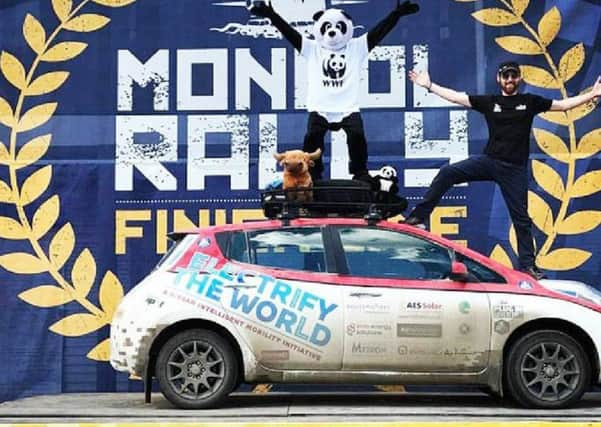Ilona Amos: Numbers starting to add up over viability of electric cars


Speaking ahead of the rally, they said they were hoping to dispel many of the myths about electric vehicles and their efficiency. And it seems like they have achieved that goal.
Detractors had warned an electric car wasn’t capable of long-distance journeys. “Well, after thousands of miles and almost zero problems, I can tell you that is not the case,” Chris says. “We’ve travelled through countless countries using just battery power and zero emissions. I’m elated, ecstatic, a bit exhausted, but also completely electrified.” The Aberdeenshire couple charged their modified 2016 Nissan leaf 111 times during the course of the journey - at distances of up to 115 miles per charge - shelling out less than £100 in electricity costs.
Advertisement
Hide AdAdvertisement
Hide AdGranted, it sounds like Siberian electricity is a bit cheaper than ours. But still, the news should provide a bit of encouragement for anyone worrying about switching to green motoring in response to Nicola Sturgeon’s pledge to phase out petrol and diesel cars. It has certainly helped convince me, a major sceptic.
The First Minister’s announcement, part of the SNP’s latest programme for government, will see traditional internal combustion engines almost entirely phased out by 2032, eight years ahead of a similar aim set out by Westminster for the rest of the UK.
Previous surveys have suggested people were being put off switching to low-carbon transport because of the expense, or more accurately their perception of it, with 45 per cent of people stating they wouldn’t buy an electric or hybrid car because of the cost.
But new research from the price comparison site Moneysupermarket suggests these folk should have another look at the figures. The firm based their latest studies on data from the three top-selling petrol, diesel and electric cars, including up-front costs, servicing, road tax and maintenance over a six-year lifespan with an annual mileage of 7,900.
There are some interesting findings. While the initial costs of petrol vehicles are the lowest, the average running cost of an electric car is 20 per cent cheaper than for diesel or petrol engines, with an average saving of £2,109 over six years. And although petrol cars boast the lowest average insurance premium – £697.19, compared to £923 for electric and £813.56 for diesel – filling up with petrol or diesel is five times more expensive than electricity. The study suggests UK drivers could save almost £8,000 on running costs by the time the UK ban is enforced in 2040 if they switch next year.
The number of EVs on the roads today has jumped rapidly in the past few years, rising from fewer than 2,000 in 2012 to more than 100,000 today. And the trend is set to continue.
To help facilitate the move, the SNP has plans to “massively expand” the number of charging points for electric vehicles and set up pilot projects to encourage uptake of the technology.
EV enthusiasts say Scotland’s charging network is fairly good and getting better all the time. But connectivity can be a major stumbling block, with a lack of mobile signal making it almost impossible to activate public charging points in some places. It’s clear we need a bit more investment to ensure the switch to green driving doesn’t leave us halfway to the middle of nowhere.